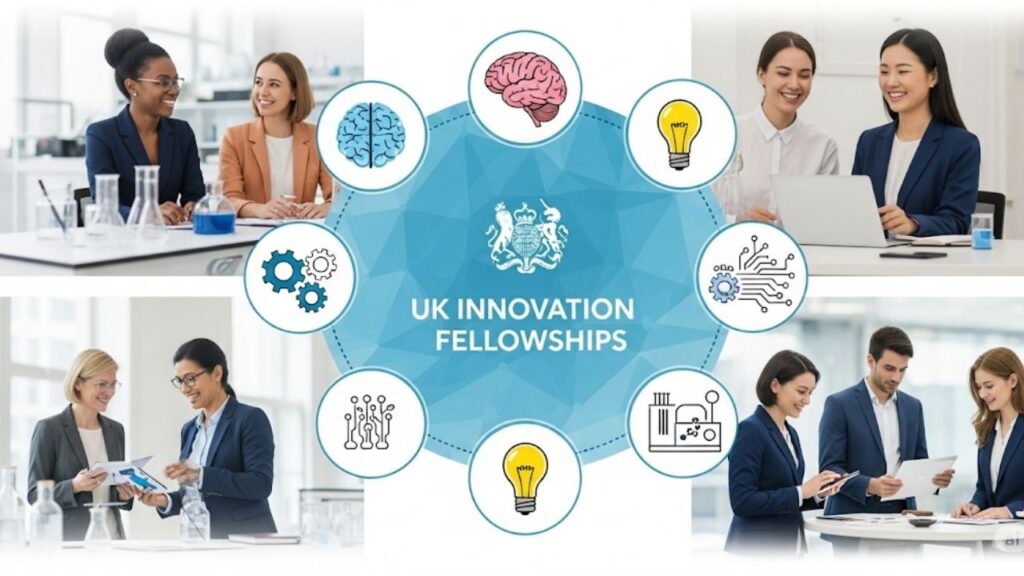Are you an ambitious researcher or innovator with groundbreaking ideas that could shape the future of the UK? The UK Innovation Fellowships 2025 are now open for applications, offering a unique opportunity to propel your career and bring your visionary projects to life. This isn’t just about securing funding; it’s about joining a prestigious community dedicated to fostering pioneering research and driving real-world impact. As someone who has advised numerous aspiring fellows, I understand the mix of excitement and apprehension that comes with such a significant opportunity. My goal here is to provide you with comprehensive, actionable, and encouraging information, helping you understand and successfully navigate this process.

The UK Innovation Fellowships, spearheaded by leading bodies like UK Research and Innovation (UKRI) and the British Academy, are designed to cultivate a vibrant landscape of innovation across various sectors. These fellowships are a testament to the UK’s commitment to nurturing talent and addressing critical societal and economic challenges through cutting-edge research and development.
What Are the UK Innovation Fellowships 2025?
The UK Innovation Fellowships 2025 encompass a range of distinct opportunities, each tailored to different career stages and thematic areas, all united by the overarching goal of fostering innovation and impactful research within the UK. These fellowships aim to develop, retain, attract, and sustain research and innovation talent, while also encouraging new career paths that bridge academia and industry. They offer sustained funding and resources, empowering fellows to tackle novel and ambitious challenges.
Why Pursue a UK Innovation Fellowship?
Securing a UK Innovation Fellowship is more than just a line on your CV; it’s a transformative experience. These fellowships offer a unique blend of financial support, career development, and networking opportunities that can accelerate your trajectory as a leader in your field.
- Dedicated Research Time: Fellowships provide protected time to focus entirely on your research or innovation project, free from many of the typical academic or professional demands. This dedicated space is invaluable for deep, impactful work.
- Significant Funding: Fellowships typically cover a substantial portion of your salary and research costs. For example, some awards can provide up to 80% of the Full Economic Cost (FEC) of your project, alongside additional research expenses. This financial backing allows for ambitious projects and the necessary resources to achieve your goals.
- Career Development: Many fellowships include tailored career development opportunities, such as mentorship, training, and international placements. This support is crucial for developing leadership skills, expanding your professional network, and gaining new expertise. As I’ve seen with many successful applicants, the structured mentorship often proves to be as valuable as the financial support itself.

Navigating Eligibility: Are You the Right Fit?
Eligibility for the UK Innovation Fellowships 2025 varies slightly depending on the specific scheme, but some core criteria are consistently emphasized.
- An early or mid-career researcher or innovator: These fellowships are primarily aimed at individuals who are either looking to establish or transition to independence in their research or innovation careers. This means if you’ve already achieved significant research independence (e.g., secured major independent funding), you might not be eligible for certain schemes like the Future Leaders Fellowships.
- Based at or supported by an eligible UK institution: This could be a university, a research organization, or a business that is registered in the UK and eligible for UKRI funding. For some schemes, like the British Academy’s Policy-led fellowships, you must be ordinarily resident in the UK with a current long-term appointment that will continue for at least the period of the award.
- Possessing a strong research or innovation proposal: Your project must be innovative, ambitious, and clearly demonstrate its potential for impact. You’ll need to articulate what you hope to achieve, how you will deliver it, and why you are the right person to lead this work.
- Committed to the UK’s innovation landscape: Many fellowships seek to attract and retain talent in the UK and contribute to its globally connected research and innovation workforce.
Crafting a Winning Application: Your Path to Success
The application process for the UK Innovation Fellowships 2025 demands thoroughness, clarity, and a compelling narrative. Here’s how to put your best foot forward.
1. Understand the Scheme’s Objectives
Before writing a single word, immerse yourself in the specific objectives of the fellowship you’re applying for. Each scheme has particular aims, whether it’s fostering new career paths, addressing specific policy challenges, or advancing a particular field. Tailor your proposal to align perfectly with these stated goals.
2. Develop a Robust Project Plan
Your project proposal is the heart of your application. It needs to be
- Clear and Concise: Articulate your aims, objectives, and methodology with precision. Avoid jargon or explain it clearly.
- Innovative and Ambitious: Demonstrate how your project pushes boundaries and contributes new knowledge or solutions.
- Feasible: Outline a realistic plan, including resources, timeline, and potential challenges.
- Impactful: Clearly explain the potential applications and benefits of your work, both within your field and for wider society and the economy. Remember, it’s not just about what you’ll discover, but what difference it will make.
3. Highlight Your Uniqueness
Fellowships are investments in individuals as much as they are in projects. Showcase why you are the ideal candidate to lead this work. This includes:
- Your Expertise: Provide evidence of your track record, relevant skills, and intellectual contributions.
- Your Vision: Demonstrate your leadership potential and how this fellowship will propel your career development.
- Your Suitability to the Scheme: If the fellowship targets early-career researchers, explain how it supports your transition to independence.

4. Secure Strong Host Organisation Support
Your chosen host institution plays a critical role. They need to provide a letter or email confirming their commitment to your project, explaining the value and benefits of your work to them, and describing any additional support they will offer. This demonstrates that you have a supportive environment in which to thrive.
5. Pay Attention to Detail and Deadlines
The application portal, typically the UKRI Funding Service or the British Academy’s grants system, will have specific formatting requirements and submission rules. Adhere to these meticulously. Double-check word counts, file formats for images (if permitted), and reference styles.
For example, the UKRI Funding Service explicitly states that applications should be self-contained and only use hyperlinks for direct reference information, not to extend your application. They also permit the use of generative AI tools but advise caution, emphasizing that you remain responsible for the accuracy of your application’s content.
The Impact of UK Innovation Fellowships
The impact of UK Innovation Fellowships resonates far beyond the individual recipient. These programs are instrumental in driving national progress across various critical areas. From developing cutting-edge AI for public services to fostering sustainable solutions and enhancing healthcare, fellows are at the forefront of tackling some of the UK’s most pressing challenges.
For instance, the No. 10 Innovation Fellowship has seen fellows rapidly prototype AI solutions for government, improving efficiency in areas like navigating extensive documents and supporting emergency services. One success story includes “Caddy,” an AI-powered customer service assistant that has cut call response times in Citizens Advice centres by half and significantly improved answer accuracy. Such initiatives demonstrate the tangible, positive change that these fellowships enable.
Unlock Global Research Horizons: Your Guide to the International Science Partnerships Fund 2025
Unlock Your Potential: Navigating the University of British Columbia Affiliated Fellowships 2025
FAQ
Q1: What is the primary difference between the UKRI Future Leaders Fellowships and the British Academy Innovation Fellowships?
A: The UKRI Future Leaders Fellowships are broader in scope, covering all of UKRI’s remit (including sciences, engineering, arts, humanities, and social sciences), and are primarily for early career researchers aiming for independence or developing commercial plans. The British Academy Innovation Fellowships, particularly Route B, are specifically for researchers in the humanities and social sciences, focusing on partnerships with policy or other sectors to address societal challenges.
Q2: Can I apply for a UK Innovation Fellowship if I already hold a permanent academic position?
A: Eligibility rules for permanent positions vary by specific fellowship scheme. For instance, the UKRI Future Leaders Fellowships state there are no eligibility rules based on whether you currently hold a permanent or open-ended position. However, the key is whether you have already achieved “research or innovation independence” by securing funding aimed at that career stage, or by managing your own significant programme of work. Always check the specific scheme’s guidance notes.
Q3: What kind of support does a host organisation need to provide for a fellowship application?
A: Your host organisation (university, research institute, or business) typically needs to confirm their commitment to your project, outline the value and relevance of your work to their strategic goals, and detail any specific resources or support they will provide to you as a fellow (e.g., office space, access to facilities, mentorship, administrative assistance). This is usually conveyed through a formal letter of support.










